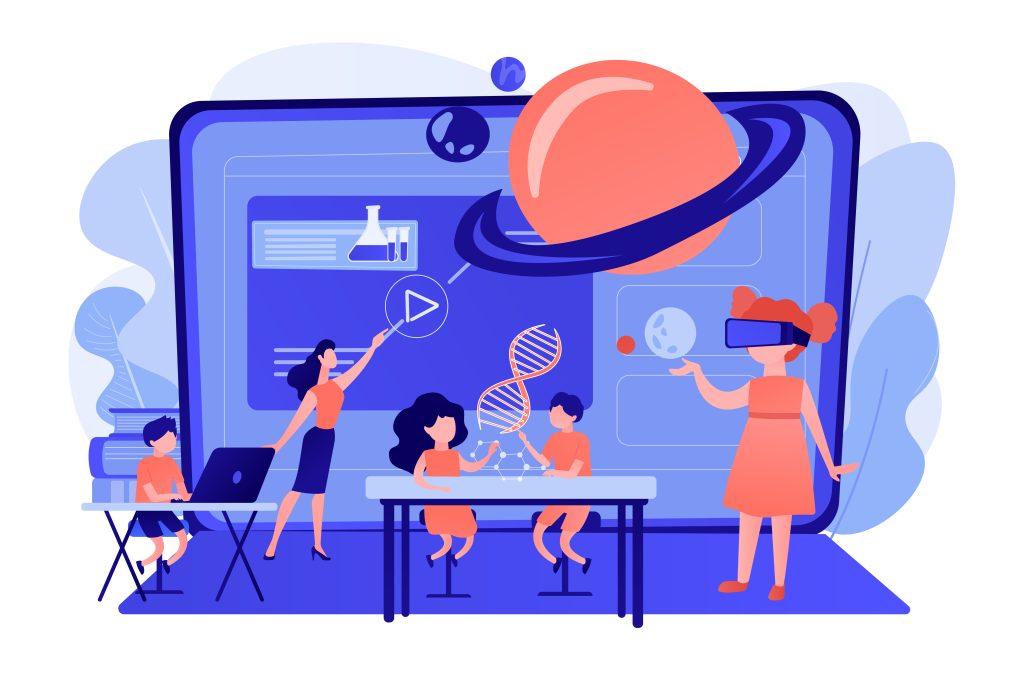Education software development services
Custom edtech software innovates all aspects of education with the goal of making the learning process more flexible and efficient. At SumatoSoft, we specialize in developing such software to help organizations implement digital technologies in learning. Our services are focused on the B2B sector: our Clients include educational institutions, corporate training departments, and EdTech startups seeking to improve the quality and accessibility of learning with the help of modern technologies.
Our education software services
EdTech consulting and digitalization strategy
We analyze your needs and processes and develop a roadmap for the implementation of EdTech solutions so that training effectively supports business goals.
Development of custom LMS and educational platforms
We create learning management systems (LMS) and turnkey online platforms, fully adapted to your requirements, brand, and audience scale.
Platform modernization and QA
We update and optimize outdated educational systems: improve UX/UI design, perform code reengineering and refactoring, migrate services to the cloud. Our quality assurance (QA) specialists conduct comprehensive testing, ensuring stability, security, and compliance of the solution with all necessary standards.
Mobile learning and applications
We design and develop mobile applications and adaptive web solutions that allow you to study at any time and from any device – increasing engagement and convenience for users.
AI learning tools
We implement artificial intelligence technologies (adaptive learning algorithms, chatbot tutors, automated assignment checking) to provide personalized learning paths and increase the effectiveness of material assimilation.
Analytical dashboards and reporting
We develop analytics systems that collect data on student performance and engagement in real time. Interactive dashboards allow administrators and teachers to track progress, identify gaps, and improve the quality of learning based on data.
Why choose SumatoSoft?
We’re a reliable technology partner with many years of experience in eLearning software development. Our key indicators speak for themselves:
13+ years
250+
99%
Compliance with standards
Partnerships
Launch your learning platform.
Ready to create an online school or corporate training portal? We build scalable, secure, and user-friendly platforms.
eLearning software we develop
Learning management systems
Digital publishing platforms
Social publishing and eLearning platform
Management and administration software
Assessment and evaluation software
Online communication software
Online schooling
Asynchronous / synchronous elearning platforms
Pools and quizzes
Virtual classrooms
Key features of our educational software
Personalized learning paths
The platforms we develop adapt to each student: they analyze their progress and offer an individual path through the materials to improve the effectiveness of learning.
Full-fledged LMS
It includes the key functionality of authoring, communication, and assessments. We implement convenient tools for creating and publishing educational materials, forums, and chats for interaction between students and teachers, and testing and knowledge assessment modules.
Virtual classrooms and webinars
We integrate the capabilities of conducting online classes in real time: video conferences, virtual classrooms, and collaborative work on an interactive whiteboard, so students experience learning as if they’re present in a classroom during distance learning.
Progress and engagement analytics
Built-in analytics tools collect statistics for each course and user: they track the time in the system, test results, and measure the level of interaction. Detailed reports help evaluate the effectiveness of courses and audience engagement.
Integration with third-party systems
We provide connections to external services and data: from educational information systems (SIS) and content libraries to corporate platforms (HR, CRM, ERP) and video platforms. Thanks to API and LTI standards, our solution becomes part of the Client’s unified digital ecosystem.
Security and compliance
We pay special attention to protecting the data of students and institutions: we implement data encryption, a multi-level access system, and backup. The platforms comply with GDPR privacy requirements, support SCORM/xAPI content standards for course compatibility, and are easily integrated with external educational tools via the LTI protocol. We also adhere to WCAG 2.1 recommendations to ensure content accessibility for all categories of users.
Create custom e-learning modules.
Need interactive courses and content? We develop custom modules that align with your curriculum and goals.
Benefits in numbers
Recent software we developed
Language learning app with AI-based personalization
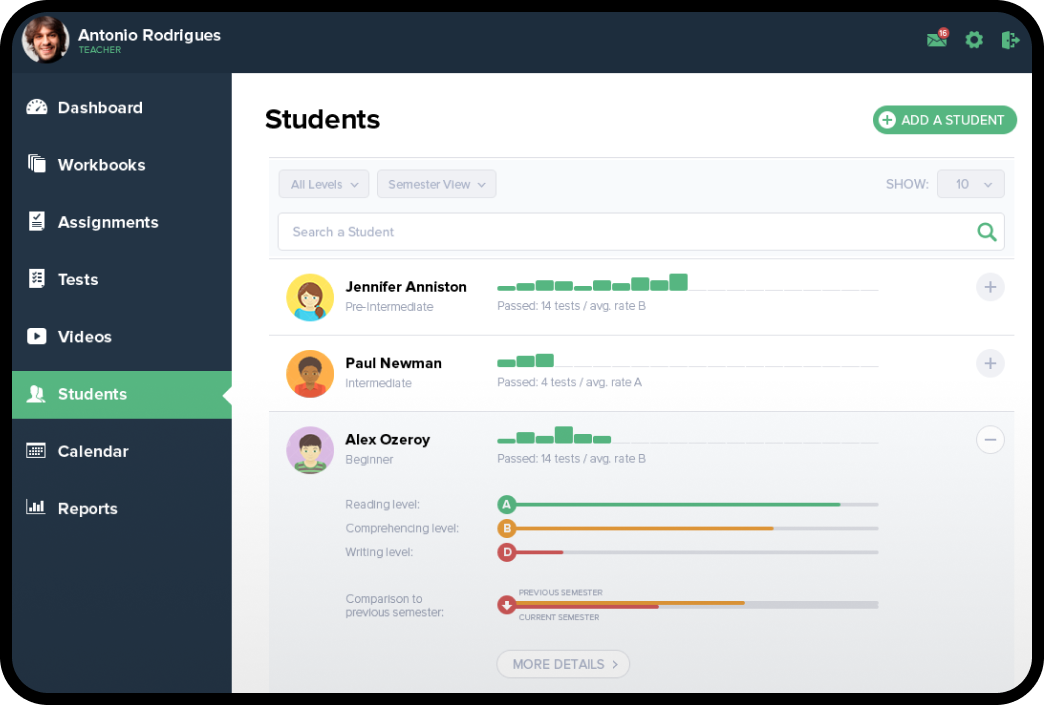

Crowdfunding & Project management platform
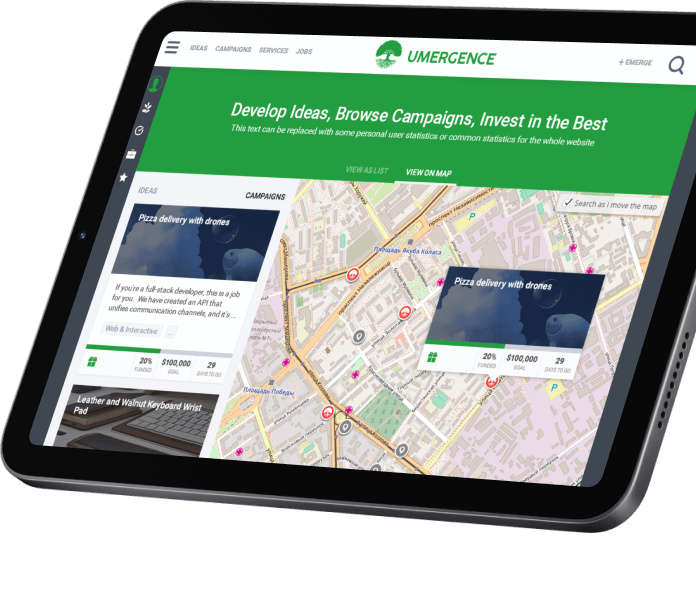
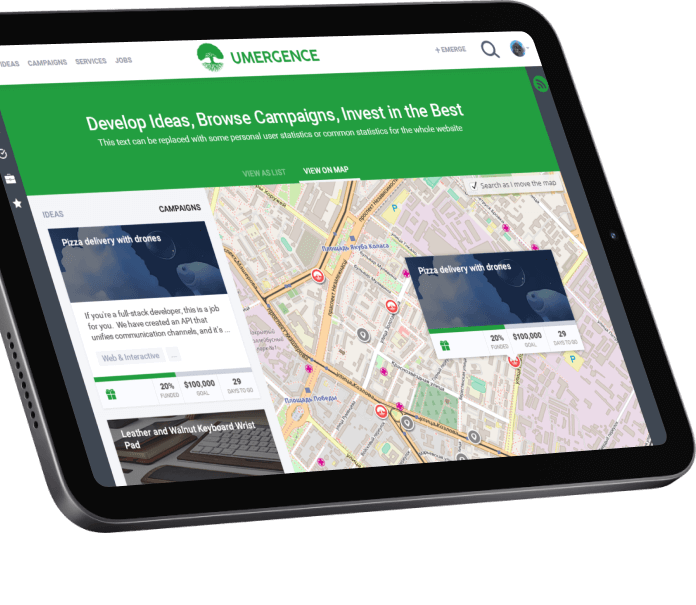
Adaptive health monitoring mobile app for personalized wellness programs
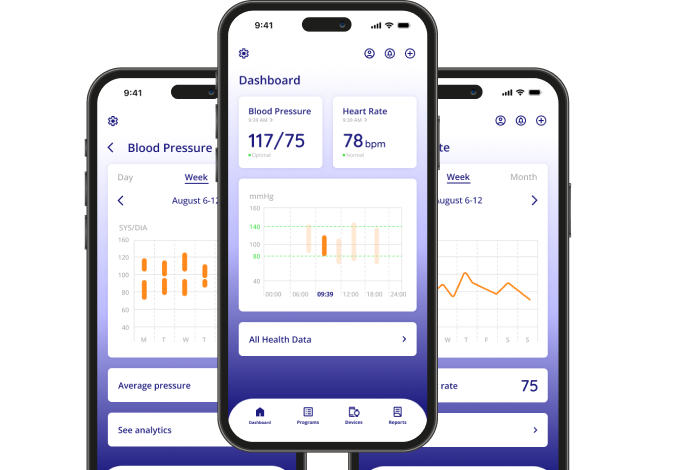

Stages of edtech solution development
Our development process is transparent and divided into the following stages:
This is the first stage, here we define the project goals together with the Client, analyze business requirements, and their students’ needs. We form a product strategy and work plan.
We develop the structure and prototypes of the user interface. We think through a convenient UX design and create interactive prototypes that allow a Client to test the concept and collect early feedback.
After the design is approved, our team moves on to software implementation. We develop functionality in iterations, integrate the platform with the necessary external systems (e.g., payment gateways, CRM/ERP, video services), conduct regular demos, and provide reports to make progress transparent.
We conduct end-to-end functional, load, security, and compatibility testing. We also check compliance with industry standards (e.g., SCORM, GDPR, etc.) and eliminate all detected errors to release a flawless product.
We deploy the ready-made system into operation (on-premise or in cloud infrastructure) and help migrate data. We also conduct training for the Client’s administrators and users to ensure a smooth implementation of the new solution.
After the launch, we continue to support the product by monitoring the solution operation and promptly responding to a Client’s requests. When necessary, we implement improvements and new functions and scale the system to a growing audience and changing requirements.
Partner for a full-cycle project.
From initial concept to final deployment and support, we handle every stage of your software development journey.
Frequently asked questions
What types of educational software do you develop?
We develop the following kinds of educational software:
- Learning management systems
- Digital publishing platforms
- Social publishing and eLearning platforms
- Management and administration software
- Assessment and evaluation software
- Online communication software
- Online schooling
- Hardware prototype development
- Asynchronous or synchronous eLearning platforms
- Polls and quizzes
- Virtual classrooms
All SumatoSoft solutions include data security and compatibility: GDPR, ISO practices, encryption, role-based access models, auditing, and WCAG 2.1 accessibility. We implement integrations through LTI/API standards and connectors to SIS/HR/ERP/CRM, which allows you to embed platforms into your IT ecosystem without expensive support operations. If you need a reliable partner for education software development services, we will design and develop a solution for your goals, metrics, and budget.
How do you ensure the software aligns with educational standards and compliance requirements?
We begin with compliance-by-design: at the project initiation stage, we create a register of applicable norms and standards for interoperability, content, accessibility, and privacy. These requirements are traced in a requirements traceability matrix and included in acceptance criteria and CI/CD gates. We simultaneously conduct DPIA/PIA and threat modeling to identify data processing risks and architectural mitigations in advance.
We ensure interoperability and correctness of training scenarios through a combination of architectural solutions and formal verification. Content packages and telemetry are validated against SCORM/xAPI; We connect external educational tools via LTI 1.3 with signature and privileged assertion exchange; assignment banks and results are via QTI; and user, enrollment, and grade synchronization is via OneRoster. We build single sign-on using SAML 2.0/OpenID Connect. We use ADL/1EdTech test suites and automated integration tests; without the successful execution of critical scenarios, the build fails in production.
We implement accessibility as a shift-left practice. Interface and content design is compliant with WCAG 2.1 AA (contrast, focus indicators, keyboard navigation, media alternatives, correct live regions, and form validation). Automatic checks are supplemented by manual audits with NVDA/JAWS/VoiceOver and “keyboard only” scenarios. We support i18n/L10n (including RTL), standardize date/number formats and terminology to ensure compliance doesn’t conflict with usability.
We implement privacy and legal requirements using privacy-by-design principles. Our architecture follows the GDPR: minimizing and limiting processing purposes, lawful grounds, access control, retention periods, and deletion. We implement DSR (access/rectification/deletion) procedures, transaction logs, and managed logging. We ensure data residency (EU/US, etc.), apply SCCs for cross-border transfers, conclude DPAs, and maintain a register of subprocessors. If a project falls within the FERPA/COPPA/CCPA framework, we add specific policies and consent mechanisms.
We ensure security through a secure SDLC and operational controls. We adhere to ISO 27001 and OWASP ASVS/SAMM standards: traffic encryption (TLS 1.2+) and data on storage media (AES-256), key management via KMS/HSM, RBAC/ABAC models, WAF, network segmentation, centralized logs and audit trails, backups, and BCP/DR plans with RPO/RTO targets. Our pipeline includes SAST/DAST/SCA, SBOM, regular dependency updates, external pen tests, and proven IR playbooks with SLAs.
We document quality and validation. We have separate test plans and regression suites for SCORM/xAPI/LTI/QTI and SSO; we conduct UAT with methodologists and instructors using real-world use cases. The Client receives a compliance package: a compliance matrix, test and pen test reports, an accessibility report, a DPIA, a handler registry, and release artifacts. After launch, we support continuous compliance: monitoring, WCAG retests, periodic audits, 1EdTech/W3C/regulatory update reviews, and managed integration changes.
This process makes SumatoSoft solutions predictable for procurement and audits, reduces legal and operational risks, and ensures that the platform actually meets educational standards, not just claims to.
Do you offer mobile and cross-platform learning solutions?
Yes. As part of our education software development services, we design and develop both native mobile solutions and cross-platform learning products, providing a unified experience across phones, tablets, and browsers. SumatoSoft handles the full cycle, from strategy and design to app publishing and support, delivering custom edtech solutions that are scalable and secure.
When the priorities are mobile device capabilities and a high level of interactivity, we offer native apps for iOS and Android. When speed to market and optimal total cost of ownership are important, we use a cross-platform stack (e.g., React Native or Flutter) with a common codebase for mobile platforms. For easy entry and rapid distribution scenarios, we use responsive web Clients and progressive web apps that run directly from the browser.
For enterprise scenarios, private distribution is available through Apple Business Manager and Managed Google Play.
We test on a wide range of devices: functional, load, and network checks, including resilience to unstable connections and limited battery life. We measure response times and resource consumption to ensure a comfortable learning experience even on mass-market devices. After release, we provide support with agreed-upon response times, regular updates, and further functionality development.
The result for the Client is a unified learning environment that is equally user-friendly across all devices, with measurable engagement and course completion, reduced time to market for new modules, and a predictable cost of ownership.
How do you guarantee the security of learner and institutional data?
Student and institutional data security is built into the architecture and development process from day one and is supported by operational controls throughout the solution’s lifecycle.
We operate according to “security-by-design/by-default” principles: we maintain a security management system (in accordance with ISO 27001), maintain an asset and risk register, implement delineation of roles and responsibilities, and strictly manage access and change controls. For projects involving personal data, we conduct data protection impact assessments (DPIAs) and establish contractual guarantees in data processing agreements (DPAs).
We separate environments (dev/test/stage/prod), segment the network, implement the principle of least necessary access, and mandate multi-factor authentication. We integrate single sign-on with corporate identity providers; application-level permissions are defined through role/attribute models, and all administrative actions are logged.
We encrypt traffic and stored data. Keys are managed by the cloud provider with separate access policies. We enable version control and secure secret storage, and use anonymization/pseudonymization for analytics. We comply with GDPR requirements: data minimization, purpose limitation, retention periods, jurisdictional residency, and the exercise of data subject rights.
We apply secure coding standards and mandatory reviews, employ static and dynamic code analysis, dependency scanning, and container scanning. Critical components are covered with automated tests and CI/CD policies. We regularly conduct vulnerability scanning and external penetration tests, remediating findings according to agreed-upon SLAs.
We evaluate external suppliers and integrations, maintain a register of subprocessors, and update contractual and technical security measures. Software is delivered through trusted registries; we use lists of components (SBOM) and integrity control.
Upon request, we also provide a set of evidence: policies and procedures, test results, excerpts from pen test reports, a compliance matrix, availability artifacts, and DPA samples. This approach reduces legal and operational risks, facilitates audits, and ensures predictable solution operation.
Do you provide post-launch support and platform upgrades?
Yes. SumatoSoft handles post-release support and planned platform development, from monitoring and rapid response to regular functional releases and infrastructure upgrades.
- 8/5 or 24/7 support lines with request prioritization and negotiated SLAs.
- Continuous monitoring, alerts, incident resolution, and root cause analysis.
- Release calendar: security fixes and patches, minor updates, major upgrades with secure data migrations.
- Compatibility monitoring: regression testing, UAT windows, phased deployments with rollback capabilities.
- Performance and scaling: profiling, optimization, capacity planning, backup, and recovery.
- Product management: roadmap, feedback collection and analysis, usage analytics, administrator training, and up-to-date operational documentation.
The result is predictable operation, rapid delivery of improvements, and reduced risks of downtime or service degradation.
Cooperation models and pricing
We offer flexible models of work to adapt to your project and budget.
Express pilot
A quick pilot project to start digital learning
As part of the package, we will develop a basic LMS or a separate module with key functionality so that you can test the idea in practice.
Fixed price and tight implementation deadlines.

Standard
A full-fledged medium-sized platform
This package includes the development of the main web platform, a mobile application, and implementation of analytics. Optimal for organizations ready for a step-by-step development of the solution.
Payment according to the Time & Materials model, which provides flexibility during the project.

Enterprise
A customized solution of the highest level of complexity
Development of a large-scale turnkey learning ecosystem with advanced AI functions, numerous integrations, and taking into account all the specific requirements of your business.
The cost is calculated individually after a detailed discussion of the technical task.

Let’s start
If you have any questions, email us info@sumatosoft.com















